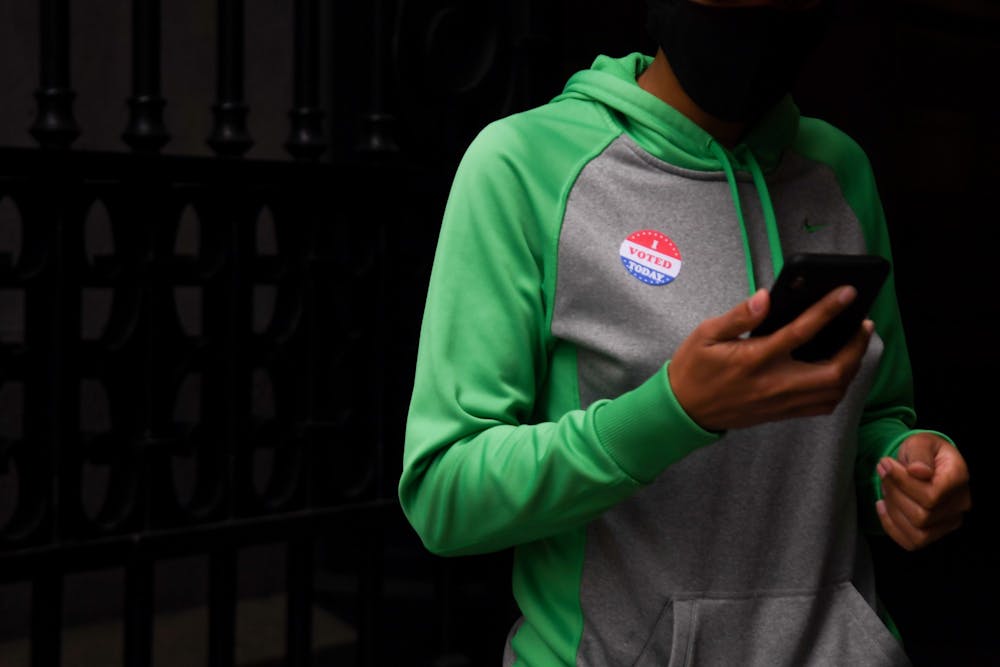
While Penn is encouraging students and faculty to vote, Election Day remains to not be a University-recognized holiday.
Credit: Sukhmani KaurPenn has repeatedly declined student and faculty pleas to give the community Election Day off, and officially stated Tuesday morning that Nov. 3 will not be a holiday for the University community.
“With Election Day just two weeks away, we write to encourage everyone in the Penn community to take the time to vote,” Penn President Amy Gutmann, Provost Wendell Pritchett, Executive Vice President Craig Carnaroli, and Vice Provost for University Life Mamta Accapadi wrote in the Oct. 20 email, acknowledging the importance of the 2020 presidential election.
But Penn remains mute on its exact capacity to change the Academic Calendar, consistently citing its compliance with Pennsylvania state regulations without explaining other unforeseen days — such as snow days, and a day off for the 2018 Eagles parade — the University has given off in the past.
“Because Pennsylvania regulations mandate the necessary length of the semester, we are unable to declare a holiday for November 3,” the email read.
The University’s Academic Calendar is set three years in advance and “balances a number of factors including regulations set by multiple accrediting bodies,” University spokesperson Stephen MacCarthy wrote in an emailed statement to The Daily Pennsylvanian on Sept. 11.
Fall break was canceled this year due to concerns about potential travel and the spread of COVID-19 in the Penn community, ostensibly adding two days that are not normally included in the Academic Calendar. Last semester, spring break was extended by five weekdays in efforts to limit the burgeoning spread of the virus and help students and faculty prepare for remote classes.
In previous years, Penn has also suddenly suspended University operations for the Philadelphia Eagles parade of champions in February 2018, and canceled classes for snow days in March 2017, March 2018, and February 2019. These impromptu decisions were made after the University had decided its Academic Calendars.
Penn's academic calendar was last reaccredited by the Middle States Commission on Higher Education — one of eight regional accrediting organizations for higher education institutions recognized by the United States Department of Education — in 2013-2014 to ensure it stayed in compliance with state and federal education standards. Prior to that, Penn was last reaccredited in 2004.
Under the Pennsylvania Department of Education's “Curricular Credit Policy” passed in March 2008, institutions are required to offer a minimum of 42 instructional hours for a semester-based course. This updated policy forced Penn to add "significant instructional time in the fall," Executive Director for Education and Academic Planning Rob Nelson told the DP in 2011, explaining that the fall semester was historically about a week shorter than the spring.
The biggest hurdle standing in the way is a state law that requires every class to meet 14 hours a semester and does not allow one semester to have more weeks than the other, a past DP article explains.
MacCarthy, Pritchett, and Nelson did not respond to requests for comment about the University’s decision or details about said Pennsylvania regulations.
Penn is notorious for having much shorter breaks compared to those offered by other Ivy League universities.
Peer institutions like Brown University and Columbia University are the only two Ivy League institutions suspending classes and offering a paid day off for faculty and staff on Nov. 3 and federal Election Days afterwards. While Brown faculty recently established an Election Day holiday in early September, Columbia began giving students the day off in 1968. Students at Harvard University and Emory University, for example, are continuing to push their universities to do the same.
Drexel University, also bound by Pennsylvania state regulations, will close at 2 p.m. on Election Day to support poll workers and provide time for its community to vote. Like Penn, other universities in the state — such as Pennsylvania State University, Temple University, Saint Joseph's University, and Villanova University — are not giving communities the day off.
Earlier this month, Penn announced a one-time initiative that offers administrative time off to staff members volunteering to be poll workers on Election Day, which they must request as “Jury Duty Time Off” by Oct. 30. Penn Medicine is not offering its employees time off or benefits on Election Day, Billy Penn reported.
Nevertheless, Gutmann and other administrators said in their email that they support the recent Faculty Senate resolution that calls on all faculty and instructors to accommodate students engaging in election-related activities, like poll working, on Election Day. The University is also encouraging flexibility by supervisors to allow time for staff to vote and faculty to avoid tests on that day to ensure no penalty to those who miss class to participate in the election process, according to the email.
"Democracies survive only if they are not taken for granted. They depend on the support of citizens," the Tuesday morning email read. "Elections determine their fate. Please take the opportunity to make your voices heard."
The Daily Pennsylvanian is an independent, student-run newspaper. Please consider making a donation to support the coverage that shapes the University. Your generosity ensures a future of strong journalism at Penn.
Donate




